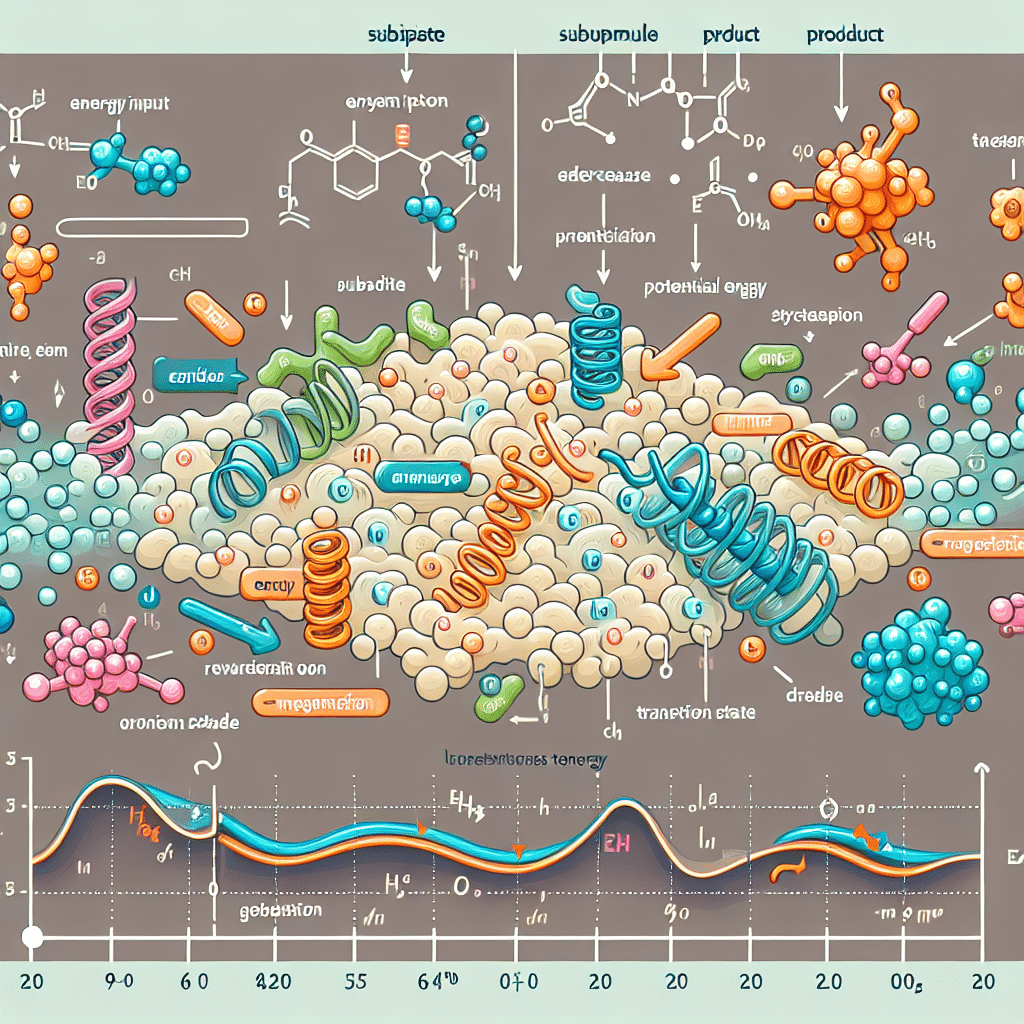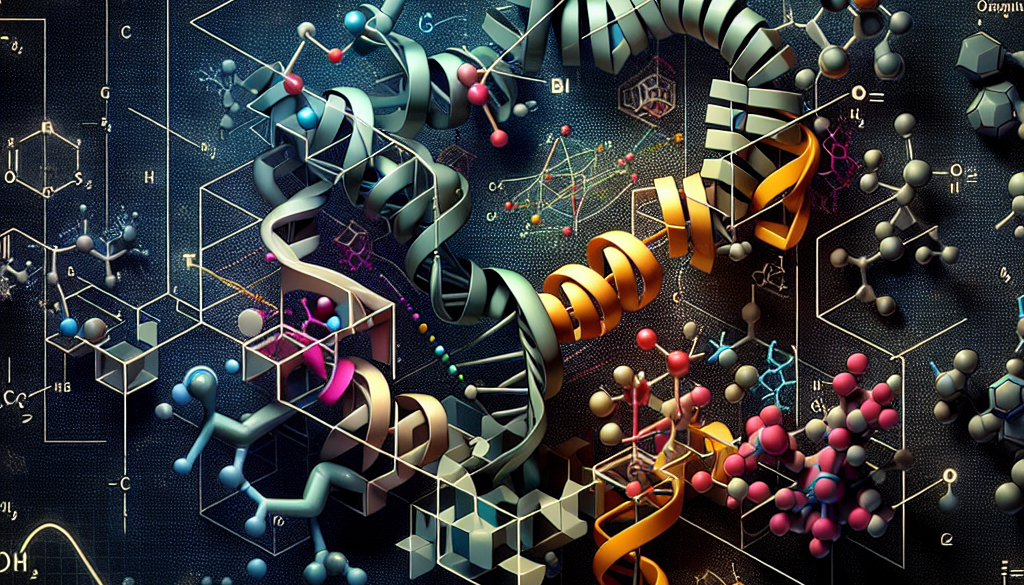Enzyme Kinetics: Understanding Reaction Speeds and Mechanisms
-
Table of Contents
- Enzyme Kinetics: Exploring the Dynamics of Biological Catalysts
- Introduction to Enzyme Kinetics
- The Basics of Enzyme Action
- Understanding the Michaelis-Menten Equation
- Factors Affecting Enzyme Activity
- Enzyme Inhibition and Regulation
- Case Studies and Applications
- Advanced Topics in Enzyme Kinetics
- Conclusion: The Significance of Enzyme Kinetics
- Discover High-Quality Protein Products from ETprotein
Enzyme Kinetics: Exploring the Dynamics of Biological Catalysts

Enzymes are the linchpins of biological systems, facilitating and accelerating the myriad of chemical reactions that sustain life. Understanding enzyme kinetics is crucial for a wide range of scientific and industrial applications, from drug development to food processing. This article delves into the fascinating world of enzyme kinetics, shedding light on how enzymes speed up reactions and the mechanisms behind their function.
Introduction to Enzyme Kinetics
Enzyme kinetics is the study of the rates at which enzymatic reactions occur and the factors that affect these rates. Enzymes are remarkable biological catalysts that can increase reaction speeds by several orders of magnitude, making otherwise slow processes occur within the timescales necessary for life.
The Basics of Enzyme Action
At the heart of enzyme kinetics is the enzyme-substrate interaction. Enzymes bind to their specific substrates and convert them into products through a series of steps known as the enzymatic reaction mechanism. The efficiency and speed of these reactions are influenced by various factors, including enzyme and substrate concentrations, temperature, pH, and the presence of inhibitors or activators.
Understanding the Michaelis-Menten Equation
The Michaelis-Menten equation is a cornerstone of enzyme kinetics, describing the rate of enzymatic reactions in relation to substrate concentration. It is expressed as:
V = (Vmax [S]) / (Km + [S])
where V is the reaction velocity, Vmax is the maximum velocity, [S] is the substrate concentration, and Km is the Michaelis constant, indicative of the enzyme’s affinity for its substrate. This equation provides insights into the efficiency and capacity of enzymes under different conditions.
Factors Affecting Enzyme Activity
- Substrate Concentration: As substrate concentration increases, the reaction rate increases until a point where the enzyme becomes saturated, and the rate reaches Vmax.
- Enzyme Concentration: Higher enzyme concentrations generally lead to increased reaction rates, assuming substrate is not limiting.
- Temperature: Enzyme activity typically increases with temperature up to a point, beyond which the enzyme denatures and loses activity.
- pH: Each enzyme has an optimal pH range where it functions most efficiently. Deviations from this range can reduce activity.
- Inhibitors: Chemicals that decrease enzyme activity can be competitive, non-competitive, or uncompetitive, each affecting the enzyme in different ways.
- Activators: Certain molecules can increase enzyme activity by enhancing the enzyme’s ability to bind to substrates or by altering its structure.
Enzyme Inhibition and Regulation
Enzyme inhibitors are molecules that decrease enzyme activity. They play a crucial role in regulating metabolic pathways and are also important in the design of drugs. Inhibitors can be reversible or irreversible, with reversible inhibitors further classified as competitive, non-competitive, or uncompetitive based on their interaction with the enzyme and substrate.
Case Studies and Applications
Enzyme kinetics has practical applications in various fields. For instance, in pharmaceuticals, understanding enzyme inhibition is vital for developing drugs that target specific enzymes. In the food industry, enzymes are used to enhance flavors, improve texture, and extend shelf life. Enzyme kinetics informs these processes by optimizing conditions for maximum enzyme efficiency.
Advanced Topics in Enzyme Kinetics
Beyond the Michaelis-Menten model, enzyme kinetics also explores more complex scenarios such as allosteric regulation, enzyme cooperativity, and multi-substrate reactions. These advanced topics provide a deeper understanding of the intricate control mechanisms that govern enzymatic activity in living organisms.
Conclusion: The Significance of Enzyme Kinetics
Enzyme kinetics is a fundamental aspect of biochemistry that has far-reaching implications. By understanding how enzymes work and the factors that affect their activity, scientists and engineers can manipulate these biological catalysts for various applications, leading to advancements in medicine, industry, and beyond. The key takeaways from this exploration of enzyme kinetics include the importance of enzyme-substrate interactions, the influence of environmental factors on enzyme activity, and the potential for enzyme manipulation in various fields.
Discover High-Quality Protein Products from ETprotein
If you’re looking for premium protein products, ETprotein offers an extensive range of organic and plant-based proteins that cater to diverse industries. Their products, known for their neutral taste and non-GMO, allergen-free attributes, are ideal for applications in nutraceuticals, pharmaceuticals, cosmeceuticals, veterinary, and food and beverage sectors. With a commitment to quality and customer satisfaction, ETprotein is your go-to source for all your protein needs.
About ETprotein:
ETprotein, a reputable protein Chinese factory manufacturer and supplier, is renowned for producing, stocking, exporting, and delivering the highest quality organic bulk vegan protein and plant proteins. They include Organic rice protein, clear rice protein, pea protein, clear pea protein, pumpkin seed protein, sunflower seed protein, mung bean protein, peanut protein etc. Their offerings, characterized by a neutral taste, non-GMO, allergen-free attributes, cater to a diverse range of industries. They serve nutraceutical, pharmaceutical, cosmeceutical, veterinary, as well as food and beverage finished product distributors, traders, and manufacturers across Europe, USA, Canada, Australia, Thailand, Japan, Korea, Brazil, and Chile, among others.
ETprotein specialization includes exporting and delivering tailor-made protein powder and finished nutritional supplements. Their extensive product range covers sectors like Food and Beverage, Sports Nutrition, Weight Management, Dietary Supplements, Health and Wellness Products, and Infant Formula, ensuring comprehensive solutions to meet all your protein needs.
As a trusted company by leading global food and beverage brands and Fortune 500 companies, ETprotein reinforces China’s reputation in the global arena. For more information or to sample their products, please contact them and email sales(at)ETprotein.com today.














